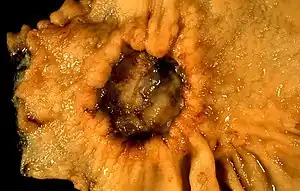Tumor of the stomach
| Tumor of the stomach | |
|---|---|
| Other names | Stomach tumor |
 | |
| A stomach ulcer that was diagnosed as cancer on biopsy and surgically removed | |
| Specialty | Gastroenterology Oncology |
| Symptoms | Early: Heartburn, bloating, upper abdominal pain, nausea, belching, loss of appetite.[1] Later: Weight loss, yellowing of the skin and whites of the eyes, vomiting blood, difficulty swallowing, blood in the stool[1] |
| Complications | Stomach cancer |
| Causes | Helicobacter pylori, genetics |
A gastric tumor is a tumor of the stomach. It can be benign or malignant (gastric cancer). The gastric mucosa is composed of columnar epithelium arranged with pits known as crypts. There are several types of cells that make up gastric mucosa that give rise to gastric tumours: adenocarcinomas comprise 90% of these. Gastric tumours are mostly metastatic and are usually detected at a late stage. They occur more commonly in men than women in the 6th decade of life.
Risk Factors
- Smoking
- Helicobacter pylori infection.
- Diet low in fruits and vegetables.
- Diet high in salt and nitrates.
- Polyps
- Genetic alterations - p53 mutation, microsatellite instability, E-cadherin gene
- Previous radiation
- Pernicious anaemia
Signs and Symptoms
Dysphagia, indigestion, feeling full after eating very little, loss of appetite, nausea, abdominal pain, loss of weight, vomiting blood and passing black stool.
Investigations
Upper Gastointestinal Endoscopy.
References
- 1 2 "Gastric Cancer Treatment (PDQ®)". NCI. 2014-04-17. Archived from the original on 5 July 2014. Retrieved 1 July 2014.
This article is issued from Offline. The text is licensed under Creative Commons - Attribution - Sharealike. Additional terms may apply for the media files.